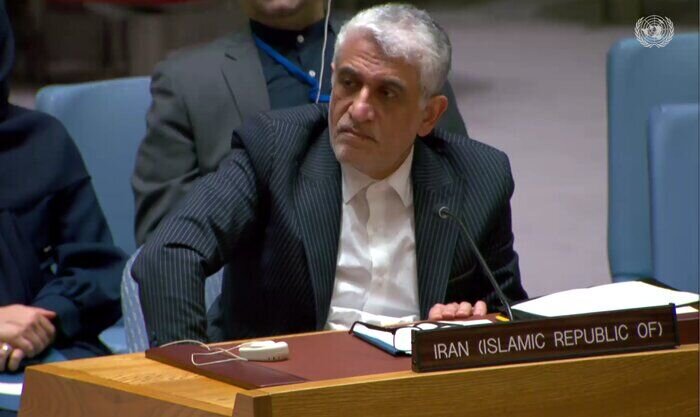U.S., EU3 to blame for JCPOA deadlock: envoy

TEHRAN- The U.S. and the European troika are to blame, according to Iran’s UN envoy, for the deadlock in the Vienna negotiations on the revival of the 2015 nuclear agreement.
“The responsibility for the JCPOA’s current situation rests squarely and exclusively with the United States and then with the E3/EU for their multiple cases of ‘significant non-performances’ of their obligations under the JCPOA as well as continuous systematic material breaches of their explicit legal obligations under resolution 2231,” Saied Iravani said in an address to a meeting of the UN Security Council on “non-proliferation: implementation of Security Council resolution 2231 (2015)”, held in New York on Monday.
What follows is an excerpt of his speech:
Since the Council’s previous briefing, the Islamic Republic of Iran has persistently worked towards the JCPOA’s revival. We have engaged in substantive talks with the E3/EU, including during the UNGA’s high-level segment. Nevertheless, despite our good faith and efforts, the other parties have taken no tangible steps thus far. Neither the US nor the E3/EU are sincere and determined to end their continued significant non-performance of their obligations under the JCPOA and resolution 2231.
As usual, today they unsuccessfully attempted to shift the narrative, switch the victim and the culprit, wage a disinformation campaign, and play a destructive blame game by intentionally ignoring the root causes of the JCPOA’s current situation. It is worth noting that the party that withdrew from the JCPOA is the US, not Iran!
Iran has only taken a number of lawful remedial measures yet a full year after the US withdrawal and the E3/EU’s inability to convince it to return to the deal and fulfill its obligations. Our objective was crystal clear: to restore the delicate balance in reciprocal commitments and benefits under the JCPOA. This was unavoidable as the deal is founded on Iran’s nuclear-related commitments in exchange for the comprehensive lifting of all UN, EU, and US sanctions as well as promoting normal economic and trade relations with Iran, as explained in detail in the JCPOA and resolution 2231.
More importantly, Iran’s remedial measures have been authorized by the JCPOA’s paragraphs 26 and 36, according to which, in case of, and I quote, “a re-introduction or re-imposition of the sanctions”, Iran has “the right”, and I repeat, Iran has “the right to cease performing” its commitments “in whole or in part”, unquote. Still, unlike the irreversible consequences of the illegal actions of the US, all our measures are reversible as soon as all sanctions are lifted in a verifiable manner.
At the same time, the United States continues to force other UN Member States publicly, explicitly, and aggressively to either violate resolution 2231 or face punishment. It is noteworthy that the US itself has been a co-penholder of, and voted for, this unanimously adopted binding resolution. Given the clear-cut legal obligations of all UN Member States under the Charter’s Article 25 “to accept and carry out the decisions of the Security Council”, such unlawful, coercive, and brazen behavior by a permanent member of this Council is highly irresponsible and unprecedented.
Likewise, the US continues defying the unanimously issued order of the International Court of Justice on 3 October 2018, which includes an obligation to remove impediments to humanitarian trade with Iran. This is yet another violation of international law by the US.
I draw attention to clear differences between Iran’s commitments under its Comprehensive Safeguards Agreement with the IAEA, and those under the JCPOA, which are reciprocal and voluntary in nature. Iran has always complied with its obligations under its Safeguards Agreement and has rendered maximum cooperation to enable the IAEA to effectively implement its verification activities in Iran. So far Iran’s peaceful nuclear program has continuously been scrutinized by the IAEA’s “most robust” monitoring and verification.
On the level of uranium enriched by Iran, I must stress that while emphasizing the binding obligations on nuclear disarmament and non-proliferation, Iran, like all other NPT State Parties, has an inherent right to enrich uranium for peaceful purposes irrespective of the enrichment level, period. Committed to its international obligations, Iran is determined to exercise this right. Despite this, so far Iran has never enriched uranium above 60%.
Consequently, strict adherence to and compliance with this requirement is imperative for all UN Member States. Any actions taken to the contrary, regardless of pretext or designation, would contravene the obligations outlined in Resolution 2231 and should therefore be avoided by the respective Member State.
Resolution 2231 has nothing to do with regional issues, and any efforts to establish such a linkage is an abuse of process.
As such, the attempt to establish a false link between the use of unmanned aerial vehicles (UAVs) in the conflict in Ukraine and the UN Security Council Resolution 2231 (2015) is misleading and entirely unfounded. Iran's position on the conflict in Ukraine is clear and consistent.
Moreover, the United States obstructed the Security Council's commitment to fulfill its Charter obligations in halting the Israeli war machine against the people of Gaza. One clear example is their use of veto here in this Chamber that prevented a ceasefire in Gaza despite the global appeal from the international community!
In conclusion, Mr. President, the Islamic Republic of Iran stands prepared to resume the full implementation of its commitments under the JCPOA once it is revived and the US and all other parties accept to fulfill timely, effectively, fully, and faithfully all their obligations under the JCPOA and resolution 2231. This indeed requires their genuine political will.
